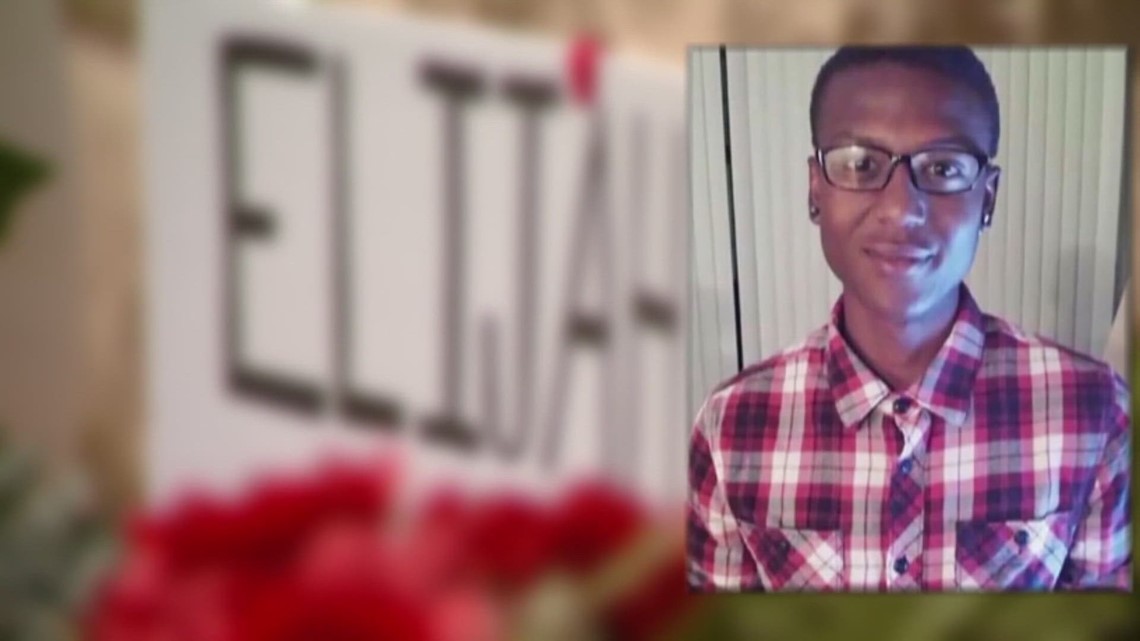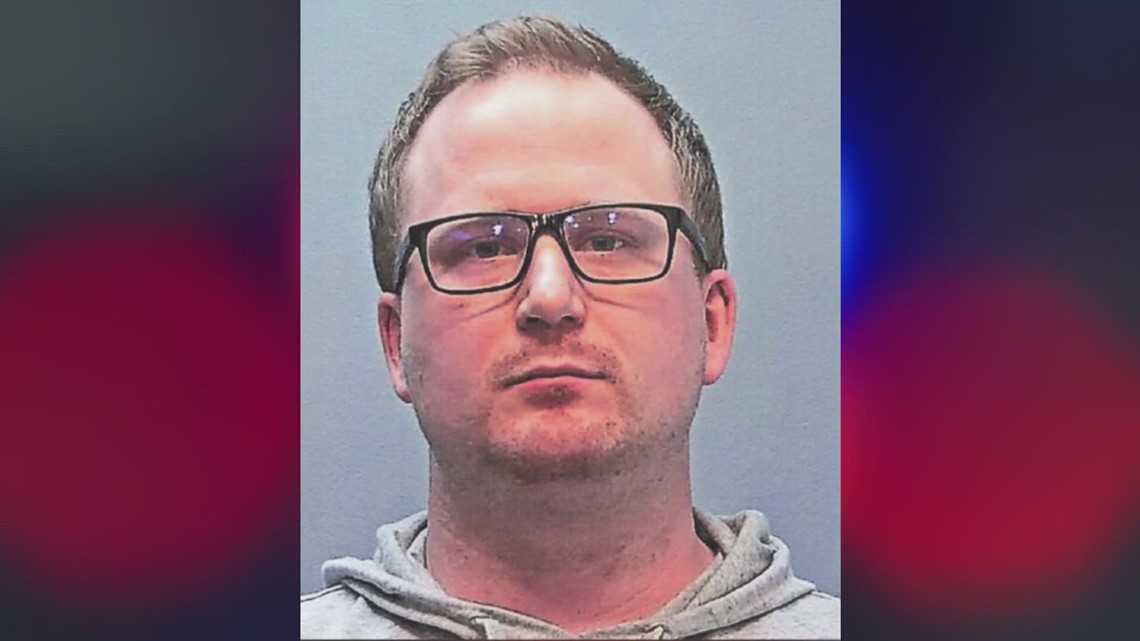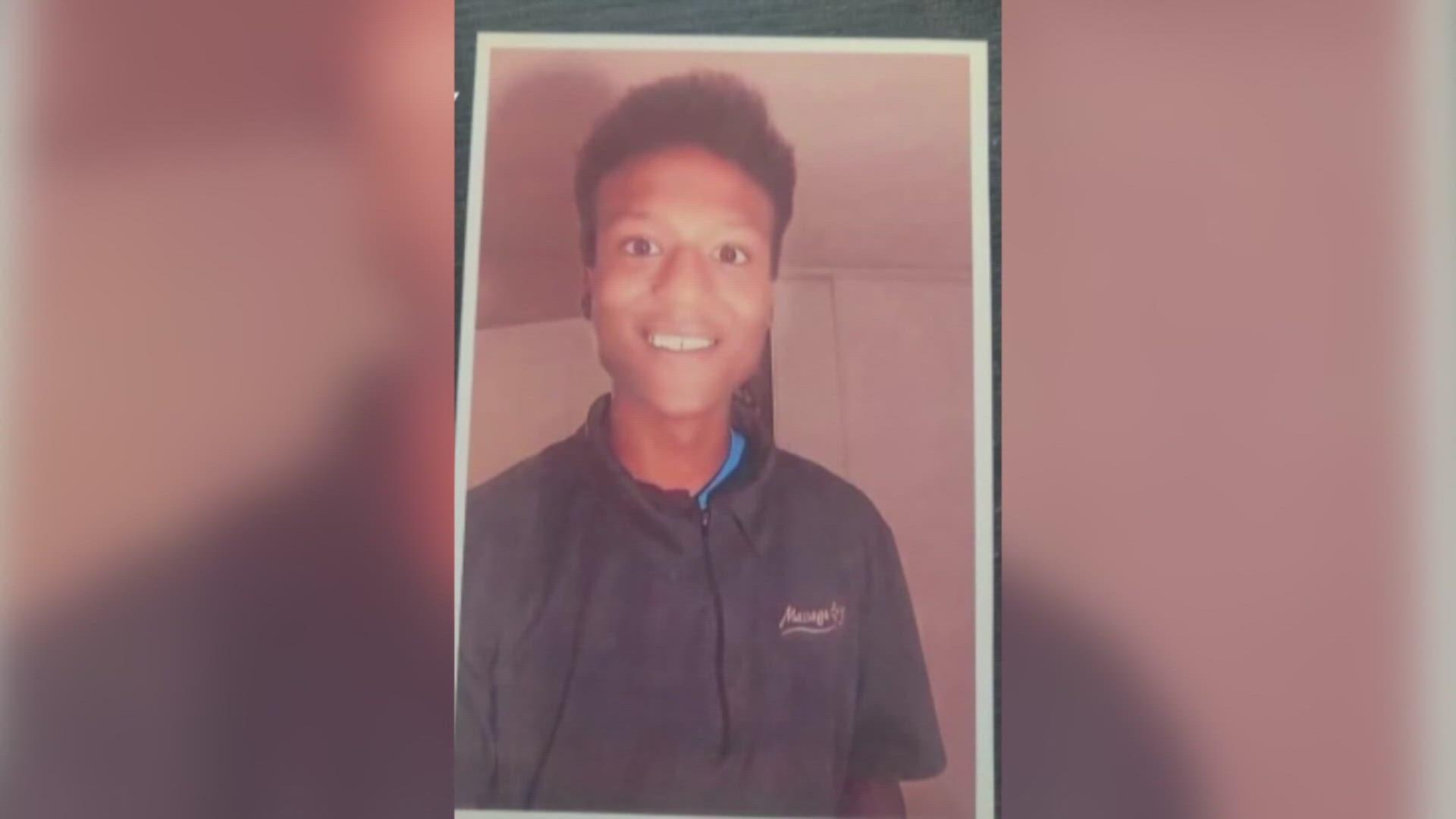AURORA, Colo. — Aurora Officer Nathan Woodyard told a jury Wednesday that his interactions with Elijah McClain in 2019 lasted minutes but said if he could go back and do things differently he would.
Woodyard is charged with reckless manslaughter and was one of five people – three officers and two paramedics – indicted in McClain's death.
He was the first officer to contact McClain on Aug. 24, 2019, after a teenage boy called 911 and relayed that he saw McClain wearing a coat and mask and acting "suspicious."
Woodyard grabbed McClain within eight seconds of approaching him, and he and fellow officers Randy Roedema and Jason Rosenblatt subdued and restrained him. In the midst of the struggle, Roedema shouted that McClain had attempted to grab Rosenblatt’s gun – an act the prosecution asserts did not happen.
"I heard Mr. Roedema say, 'He grabbed your gun dude,'" Woodyard told the jury.
"What did you hear before that?' asked his defense attorney Megan Downing.
"I heard Mr. McClain say I intend to take my power back."
"What went through your mind?"
"I was expecting to get shot and I thought I’d never see my wife again," Woodyard replied.


Woodyard explained that he fell backward and that within seconds all three officers were on the ground with McClain in a struggle during which he lost his glasses.
"At that point, I didn’t know if he [McClain] had successfully retrieved a gun or if other officers were fighting over a gun in a holster," Woodyard said. "My first thought was this needs to end immediately."
When the opportunity presented itself, he told the jury he made the decision to use the carotid hold on McClain, which briefly rendered him unconscious. He was handcuffed after that, because Woodyard said, at the time, he believed McClain had just tried to grab an officer's gun.
Shortly after, Woodyard said he recalled hearing McClain complain that he could not breathe.
"What did you do in response to that?" asked Downing.
"I looked at him and he still had his mask on so I took that off," Woodyard said.
"Tell us how you did that."
"I grabbed it from the top of his head and just threw it into the grass," Woodyard replied.
"Why did you do that?"
"Because he said he was having trouble breathing. I believed the mask, at best, would be uncomfortable but at worst be the cause of him not breathing," Woodyard said.
He said he believed that his removal of the mask alleviated McClain's breathing issues and that shortly after, his direct supervisor Sgt. Rachel Nunez arrived and pulled him away from the scene. She testified Tuesday that Woodyard appeared in shock and looked like he needed a break.
Woodyard testified that he was "overwhelmed" and "scared" and agreed that he was not in a position to continue with the duties of the job.
"I was scared that my emotions - they might prevent me from being able to help," he said. "At that point, I felt that I was more of a hindrance."
"When you walked away what were you thinking about the condition of Mr. McClain?" Downing asked.
"When I walked away, I thought that he was in the recovery position - there were officers with him - I thought he was safe."
"Did you trust other officers to take care of him?"
"I did," he said.
"Did they?"
"No," Woodyard replied, before adding, "I know that now."
He didn't know then because he walked away for a conversation with Nunez before going to his patrol car moving it out of the street, he said. He also attempted to call his wife, he said in court.
He returned to the main scene shortly before paramedics injected McClain with the sedative ketamine. Woodyard said he assisted with getting McClain onto a stretcher and was later told by another sergeant at the scene that McClain's heart had stopped in the ambulance. He was taken off life support several days later.
Under cross-examination there were many things Woodyard said he wished he could have done differently - starting with his first interaction with McClain.
"If you could go back in time, when you walked out of that police car you wouldn’t have come out hot? Stop. Stop. Stop. You would have done it differently?" asked prosecutor Jason Slothauber.
"Yes," Woodyard replied.
"You wouldn't have grabbed him as soon as you got up next to him?
"Yes."
"And if you could go back in time, you would take back that carotid hold?
"Yes," he replied after a very long pause.
Prosecutors also got Woodyard to concede that he violated numerous department policies, including the obligation to de-escalate when possible and to monitor someone after a carotid hold.
"Were you conscious of any risks to Mr. McClain based on your interactions with him?" Downing asked Woodyard on re-direct.
"No, I was not,' Woodyard replied.
Earlier Wednesday, a sergeant who responded to the scene told jurors that he had concerns about McClain's condition but that officers aren't trained to treat people in their custody and had to wait for paramedics to arrive.
"We had been on scene for what seemed like an eternity. I had already asked for medical once or twice," said Sgt. Dale Leonard. "I'm practically begging dispatch where the heck is fire at? I’m obviously concerned.”
Leonard said he was the first to arrive at the scene after the initial struggle between McClain and the three officers began. When he arrived, he said McClain was on the ground and in custody.
He told jurors that the officers acted appropriately when they placed McClain in the recovery position and waited for medics even as his condition worsened.
"I’m realizing he does seem to be deteriorating. He’s not speaking clearly. He’s less interactive, he was very interactive at first and now he’s not," Leonard testified.
"Is there anything you could have directed another officer to do to address your concerns about Mr. McClain’s condition at that time?" asked defense attorney Megan Downing
"No," Leonard replied.


On cross-examination, prosecutors pointed out that there were things Woodyard could and should have done.
"Mr. Woodyard didn't tell you about any concerns Mr. McClain made about his ability to breathe?" asked Slothauber.
"No," Leonard replied.
"That information that Mr. McClain had thrown up inside of his mask while it was still pressed up against his face that would have been important information for you to have?' Slothauber pressed.
"That's part of the situation yes," Leonard replied.
"It's not just part of the situation, it's important information for you to have."
“I would have liked to have known that yes,” Leonard said.
On redirect, Leonard said he did not believe McClain's worsening health was related to the action of officers, and instead thought it was the result of drugs that he believed McClain had taken.
According to medical records, the only substances found in McClain's system were marijuana and ketamine.
The jury is set to return at 9:30 a.m. Thursday when the defense is expected to call their final witness in the case.
Woodyard remains suspended without pay pending the outcome of this case. If convicted, he could face up to six years in prison.
A separate jury heard the case against Roedema and Rosenblatt. Jurors in that trial acquitted Rosenblatt of all charges but convicted Roedema of criminally negligent homicide and third-degree assault. He's set to be sentenced in January.
Jeremy Cooper and Peter Cichuniec, the paramedics who responded to the call, are set for trial later this month.
They are each charged with reckless manslaughter and numerous counts of assault and are due in court Thursday morning for a hearing. Both are suspended without pay while they await trial.
SUGGESTED VIDEOS: Elijah McClain death

